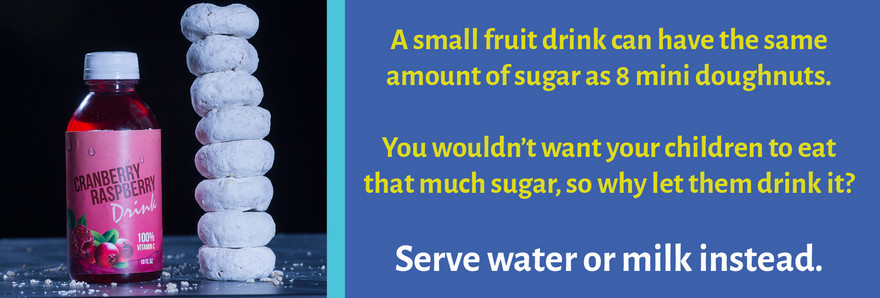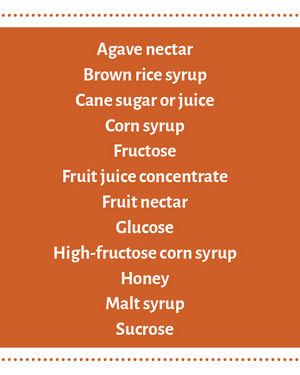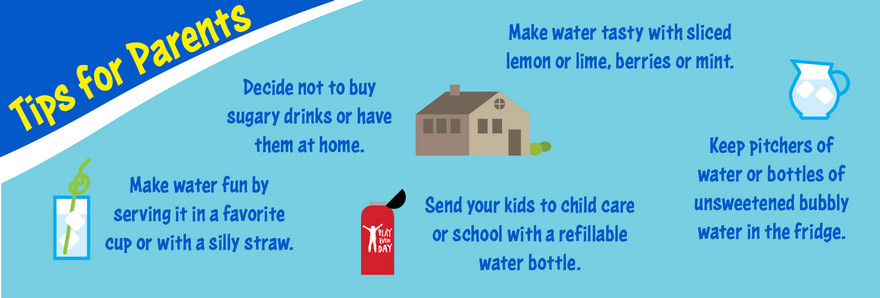Healthy Drinks for Preschool-Age Children
Little kids need healthy drinks like water and milk to build strong bones and bodies.
What they often have instead are
sugary drinks. Sugary drinks are the No. 1 source of added sugar in their diets. In 2019, four leading health organizations worked together to share a new report called "Healthy Drinks, Healthy Kids." All four organizations agreed:
Sugary drinks are not recommended for children ages 5 and younger.
Serve healthy drinks to your children.
-
Birth to 1 year: Choose breast milk or iron-fortified formula only.
-
1–2 years old: Serve water and pasteurized whole white milk.
-
2–6 years old: Serve water and pasteurized fat-free (skim or nonfat) or low-fat (1%) white milk.
Many drinks have added sugar.
Some children start having sugary drinks at an early age — most commonly fruit drinks and powdered drinks. The labels on these drinks can make them look healthier than they really are.
Don't let that label fool you.
Drinks can be loaded with added sugar, even when they:
- have a fruit in their name — like cranberry or raspberry.
- say they are organic.
- have "100% vitamin C" written on the label.
A drink can have a fruit in its name and NOT be made with any fruit juice. Some fruit drinks can have a
small amount of fruit juice, but they're still
loaded with a large amount of added sugar.
Organic drinks often have the same amount of sugar as non-organic drinks. Both organic and non-organic drinks with added sugar can lead to health problems in little children.
A drink that contains 100% vitamin C can have added sugar along with the added vitamins.
One small sugary drink can hide a lot of added sugar.
For the best health, the
U.S. Dietary Guidelines for Americans recommend children younger than 2 have foods and drinks without any added sugar. The guidelines recommend limiting the amount of added sugar older children consume to less than 10 percent of their total daily calories. For example, a 4-year-old child should limit added sugar to about
8 teaspoons a day. Small drinks like fruit drinks can be packed with that much sugar, even more.


Look for that hidden sugar and limit it.
Added sugars can be tricky to spot because they go by many different names. They’re called high fructose corn syrup, honey, glucose, sucrose and other names.
Read the label.
Check the back of the bottle to see how much added sugar is in your drink. If sugar or any other sweetener is listed in the first three ingredients, your drink is likely loaded with sugar.
Limit 100% fruit juice for little kids.
100% fruit juice contains natural, not added sugar, but even natural sugars should be limited. 100% fruit juice has vitamins, but it lacks the fiber of whole fruit that can help kids feel full. Eating whole fruit instead of drinking fruit juice is the best way for kids to get the recommended daily servings of fruits.
The American Academy of Pediatrics recommends the following limits for 100% fruit juice:
-
Babies younger than 1 years old: No 100% fruit juice
-
1–3 years old: Less than ½ cup (4 ounces) daily
-
4–6 years old: Less than ¾ cup (6 ounces) daily1
What you do today matters tomorrow.
Your kids are young. You might not be thinking about preventing chronic diseases during preschool.
But did you know that the healthy drinks you serve them now
plus daily physical activity can improve their chances of preventing diseases like type 2 diabetes, heart disease and many types of cancers years from now?
Choosing healthy drinks and being active while growing up can prevent diseases that last a lifetime. That’s a great investment that you can work toward right now with your family.

Share the message
Do you want free printed copies of our
posters or educational handouts? Please contact us at
playeveryday@alaska.gov.
Publications older than 25 months can be found on the
State
of Alaska Library Archives website.
Learn more
References:
- American Academy of Pediatrics. Fruit juice in infants, children and adolescents: Current recommendations. Pediatrics. 2017; 139(6):e20170967.
Webpage updated January 2022